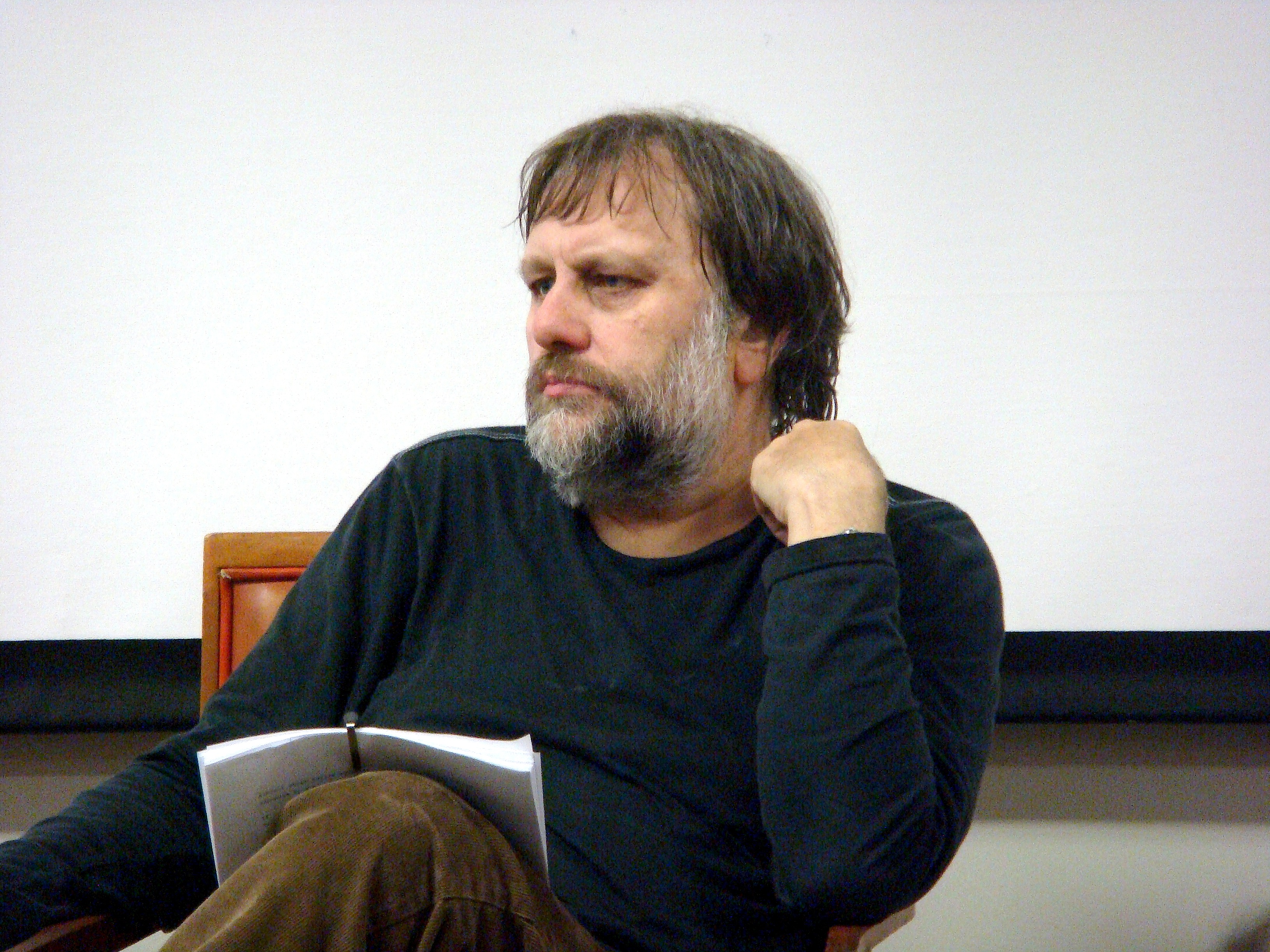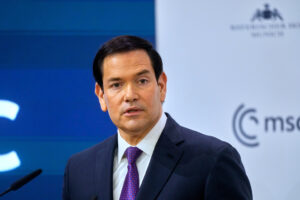Slavoj Žižek talks about Greece and Syriza

Picture by Andy Miah | Flickr

It is incredibly difficult to listen to Slavoj Žižek without allowing his personality to obscure what may be utter brilliance and innovative thought on the state of Europe, particularly Greece. He is less instantly recognizable in the Unites States, but in Europe Žižek is the rock-star version of a philosopher. In a talk given at NYU on April 14, Žižek spoke about the importance of Syriza, the left-wing political party represented by Alexis Tsipras that won the 2015 legislative election in Greece.
Immediately, the talk became more about him and his personal diatribes than Greece. Right after he took the podium and promptly corrected a statement made in the introduction that he is no longer asked to contribute to the New York Times and the Guardian, an audience member wearing only a ragged piece of brown cloth around his waist and an animal mask rushed the stage, pushing Žižek out of the way. He spoke into the microphone and, although his words were indecipherable, they were clearly emphatic. The protestor was pulled from the stage, and Žižek moved back to the podium.
Perhaps this had surprised him so much that he was unable to move. Or perhaps he was listening, although he said that he did not know what the protestor was saying. In any case, he did not make any moves towards the intruder. But as he regained his composure, he immediately stated that he would like for the man to return so they could engage in some vulgar sexual activity. The audience of the quasi-packed auditorium, for the most part, seemed to find his cursing extremely funny.
This set the tone for a large portion of the rest of his talk, which relied heavily on obscenities and dirty jokes, even using derogatory language to refer to one of the event organizers, which, again, was met with a large degree of laughter by the crowd.
It is difficult to follow Žižek and he knows it. He forewarns the audience that he may go off on a tangent because he likes to listen to himself talk. He even goes so far as to invite the crowd to cut him off if his tangents took him too far off topic. This never happened, although maybe it should have. The beginning of his discussion on Syriza focused on a variety of issues, such as racism and the “white men’s burden,” the idea that “we are responsible” when other countries struggle and we, white men, have to impose our values to the others. Instead, he said the idea should be “you are free to join our corruption.”
He talked about traditional power structures. Power is typically conveyed through a symbol, he explained. “(A king) appears as a king because we treat him as one. The power is condensed in the insignia.” In contrast, modern democratic societies no longer require insignia to demonstrate power; “(rulers) are common people like you.” Empathy and recognition as equals are what legitimate them. Or as Žižek declared, the modern citizen thinks, “I know very well you are a miserable weak guy like me, and because of this, I will follow you.”
His next point was on cynicism and fetishism, which he connected to Snowden and the impact the NSA leaks had on the public. But Žižek didn’t get into the protection of privacy debate. Rather, he said the public and media obsession with the case was a fetish. According to him, this information was not new, and yet by having it openly relayed to the public, it became an obsession, something that the public could not let go of even though they had known this on some level prior to the leaks. He compared this to adultery, using the example of a husband and wife, where the wife is sleeping around and the husband pretends everything is fine while it is hidden.
From here, he moved on to strikes and workers. He is against some strikes, he said, because to go on strike is an extreme privilege that is not available to the masses. Those who are not lawyers or doctors cannot do so because they run the risk of being fired. This led him to question the idea of freedom, asking two main questions: Are we free? And a freedom of whom, to do what?
At this point, I actually stopped writing for a period of time. My notes drift off in the middle of the word “excess” as he talked about the “explosion of personal human freedoms” that are presumably preventing radical change. He had been speaking for an hour, and very little had been said. I was debating whether to stay or leave when he finally mentioned Syriza for the first time, in talking about the meaning of democracy. Žižek defines democracy not as a freedom of choice, but a freedom to “connectively restructure and redefine the very social texture that ultimately decides what choices we do have.” For Žižek, this restructuring implies a total overhaul of the current social system’s makeup, which could be done through Syriza.
There’s an excess of personal freedoms, concluded the Slovak philosopher. The idea that only the current power and economic structure can allow for personal freedoms is wrong, he tried to argue while criticizing the United States. Žižek advocated for “a global world power strong enough to overrun the interest of capital.” Is Syriza going to be this new power that overturns the Western-imposed status quo? He hinted at that, but never really backed his lucubration. Instead he talked about his friendship with Yanis Varoufakis, the Finance Minister of Greece—as he put it, “butt or target of my most vulgar jokes.”
While Syriza is certainly revolutionary, Žižek argued, it cannot be considered on the same level as social measures taken 50 or 60 years ago. “You ask for radical revolution, and you guarantee that nothing will change.” Rhetoric of revolution is not enough. Action needs to follow the request for revolution, which is a second step that seems to be missing from past attempts at large-scale change. He even said people are laughing at Syriza, but he did not believe this could be a reason to discredit their aims. After all, he said “The important thing is to start the process.”
In what he called the “dark part of the talk,” Žižek mentioned austerity and its ineffectiveness in Greece. Syriza’s promise is “go with us and you will at least get some money back,” he said, and they have been critical of the west, especially Germany. His main critique seemed to be that other countries have been able to get away with more than Greece can.
This could have been Žižek’s opportunity to delve into the current political situation and a description of Greece’s needs within the context of the European Union, but he did not talk about this. He also didn’t mention what the real benefit of radical change through Syriza to the working class could be, and how quickly these benefits will be felt. Žižek’s arguments were broad statements followed by somehow-connected examples that, in many cases, were not even Europe-centered; the lecture felt scattered and disorganized.
As it happens with some rock-stars, it seemed that he was there more to fulfill his own narcissistic aspirations than to deliver a critique on Syriza’s potential benefits. Perhaps if you are a huge fan of his persona, this was a great opportunity to be able to tell your grandkids in the future, “I was there.” But if you came to learn something from what is supposed to be one of the greatest philosophers of the 21st century, you probably left empty-handed. Or at least with a lot of ideas that are hardly grounded in reality.
Katherine Whittaker is a first year M.A. student pursuing degrees in both European and Mediterranean studies and journalism. She graduated from Elon University with degrees in English, Spanish, and art, and traveled extensively throughout South American during those four years. Her research areas of interest include public and street art, collective memory, and insularity throughout the Mediterranean.




